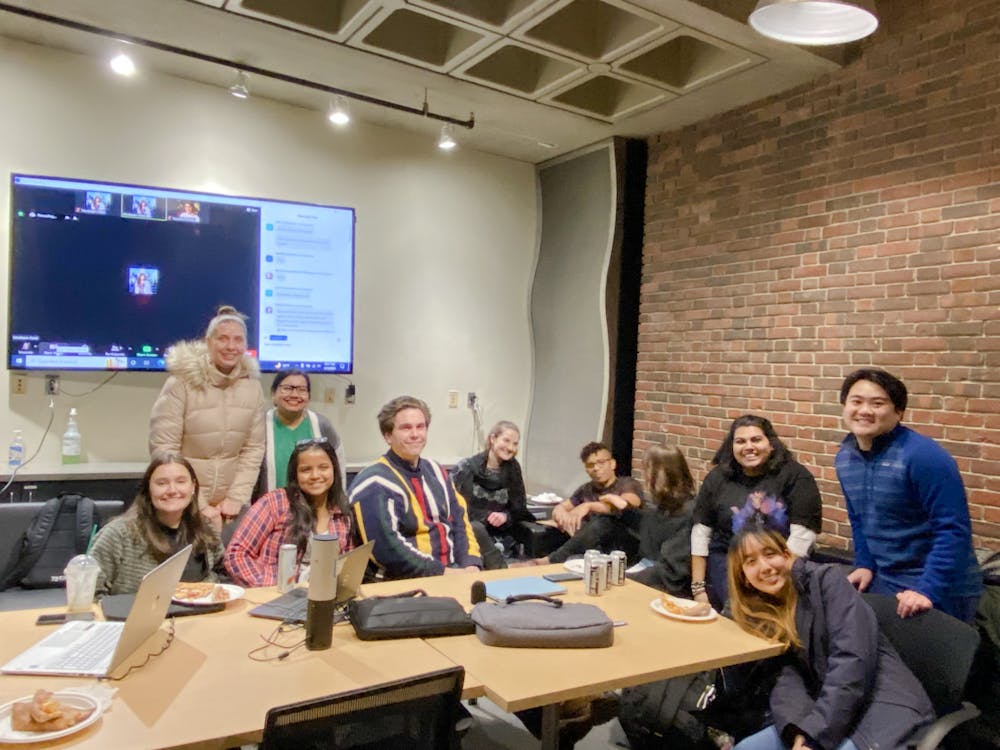The Graduate Student Council approved a new budget of $114,000 for the spring at its first meeting of the semester Wednesday. It also allocated $15,000 of its savings for food-insecure graduate students.
GSC’s budget for the spring is over $30,000 more than last year’s $81,193, according to GSC Treasurer Sofia Verba GS. Every relevant category of the budget will have increased funding, aside from the standard $2,000 allocated for contingencies and savings.
Verba partially attributed the increased budget to a rise in the number of graduate students, who contribute to the budget through a semesterly student activities fee. A total of 2,920 graduate students were enrolled at the University fall 2022, up from 2,689 student the previous fall, according to data from the Office of Institutional Research.
Budgeting for food insecurity
The council approved an allocation of $15,000 from its savings to target food insecurity. “We’re going to make sure everyone who needs food gets food,” said GSC President Joe Colleyshaw GS, adding that if food insecurity continues to be a major problem, “we can take it to the union as well.”
As of last spring, GSC’s food insecurity program, which serves about 120 graduate students per semester, is no longer paid for out of GSC’s budget, but instead through the council’s savings, according to Colleyshaw and Verba. This change came after “the graduate school, the President’s office and Provost’s office pulled all financial support for the food program,” Colleyshaw said.
University Spokesperson Brian Clark said the initial food insecurity program was a pilot and that the University has “shifted to a more sustained approach to supporting food security for graduate students,” including increased stipends, partnerships with colleagues in Financial Aid and the Meal Gap program.
“As the Graduate School continues to focus on a multi-pronged, sustainable approach to food insecurity among graduate students,” the University will continue to collaborate with GSC in supporting graduate students, Clark added.
“Food insecurity is actually starting to affect the master’s students a lot more than PhD students,” said Abdullah Rashid GS, chair of student life. “I’ve been collaborating with the School of Professional Studies to try and gauge the need for the food pantry and more food resources specifically for master’s students.”
Colleyshaw noted that graduate students in financial distress facing “a one-off, unexpected occurrence” can apply for help using the University’s E-Gap Funds, which offer “an up to $500 loan that you pay back with no interest.” He added that students can now apply for funds multiple times throughout their time at the University.
Additional budget allocations
$45,000 from GSC’s budget will go to social events, compared to last spring’s $33,000 allocation. Verba said that because the University lifted its COVID-19 protocols, GSC can host more extensive community gatherings, including trivia nights, a spring formal and a field day for graduate students and their children.
The master’s advocacy committee funding doubled from $2,000 to $4,000 since last year to account for an increased number of master’s students, Verba added.
The professional development travel fund has almost doubled from $17,000 to $28,000 since last year. According to Verba, graduate students can now apply for up to $300 to cover travel to conferences.
Funding for the student life committee is also close to twice what it was last year, increasing from $6,000 to $11,000. Verba said that this money will primarily go towards creating a food pantry, maintaining and revamping the graduate student lounge and starting a program to assist graduate student parents.
Student resources, future projects
The meeting also featured an announcement from the Graduate Labor Organization, which invited graduate students to join its first general body meeting Feb. 7 and provided insight into the union’s contract renegotiation with the University, which will occur later this month.
Assistant Directors of International Student Services Jennifer Dressen and Sonja Paulson attended the meeting to describe the resources offered by the Office of International Student and Scholar Services. This aid includes professional assistance navigating U.S. employment systems and accessing nonresident tax software, as well as immigration guidance and processing.
GSC’s seven internal committees — Nominations, Finance, Social, Student Life, Master’s, International and Communications — also took the floor to present their plans for the semester and asked graduate students to sign up to volunteer on the committees.
The nominations committee will look for a new Dean of the Graduate School this semester, while the communications committee is working on providing hygiene products in restrooms and improving shuttle access.
GSC also discussed the potential for a new graduate student center. Colleyshaw said that the council is $5 million short of being able to build a designated graduate student building on campus, but added that he would bring the subject up in the upcoming Brown Corporation meeting.
“We’ve been shouting about this for three years,” Colleyshaw said. “And we’re going to continue.”

Katie Jain is a University News editor from New Jersey overseeing the graduate student life beat. She is a senior concentrating in International and Public Affairs and History.





